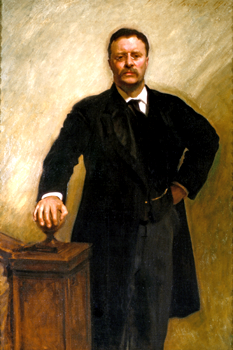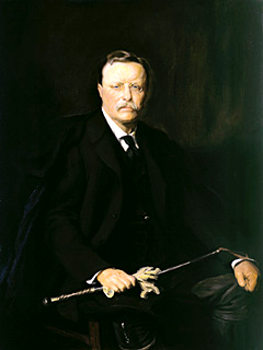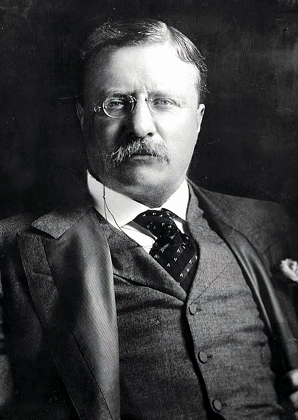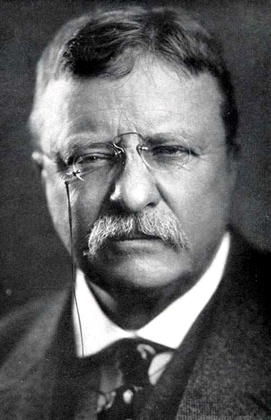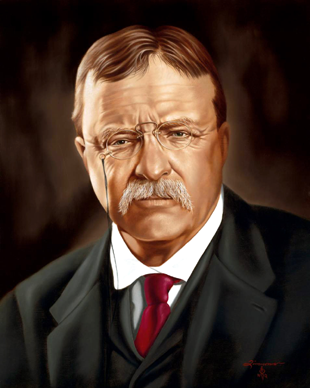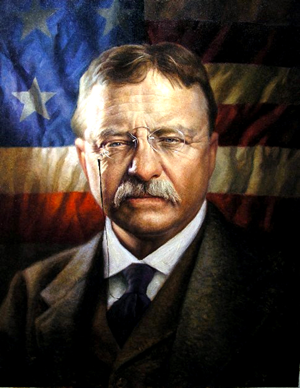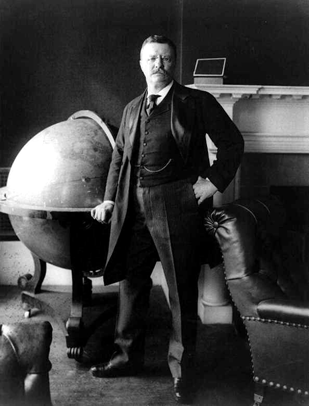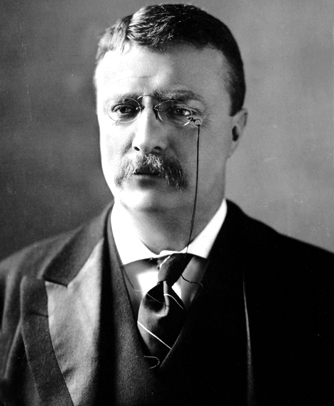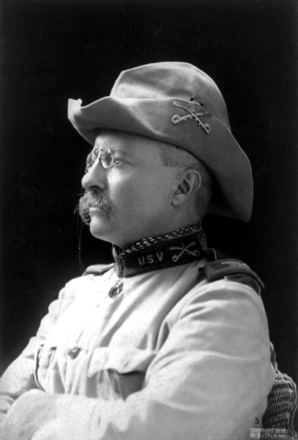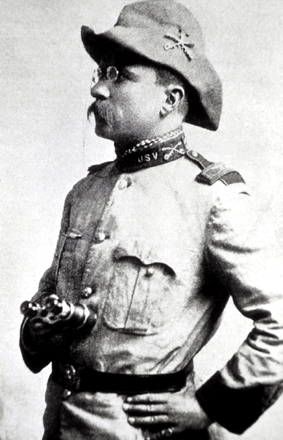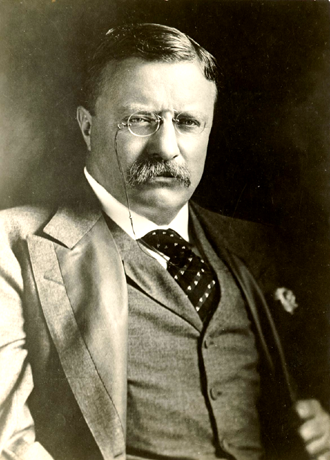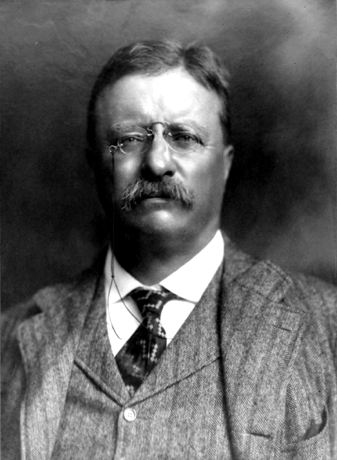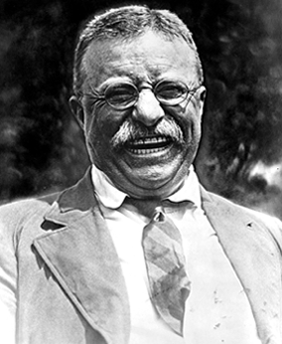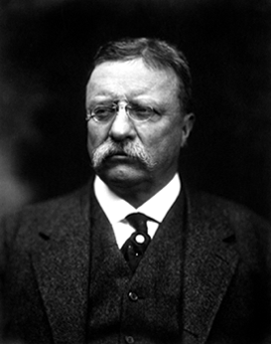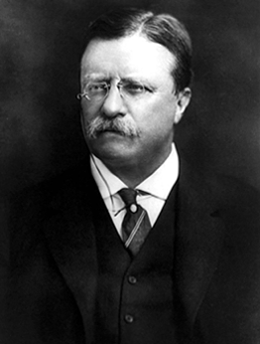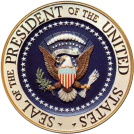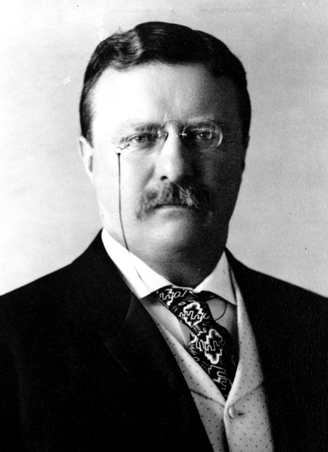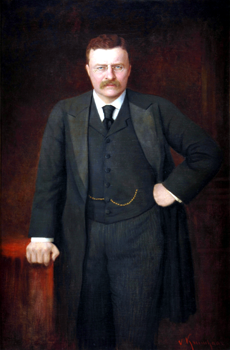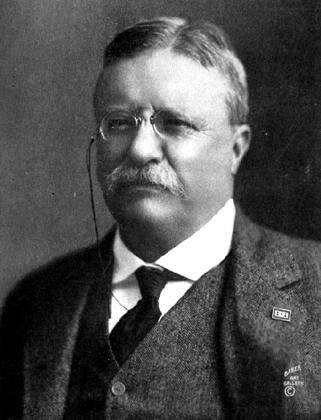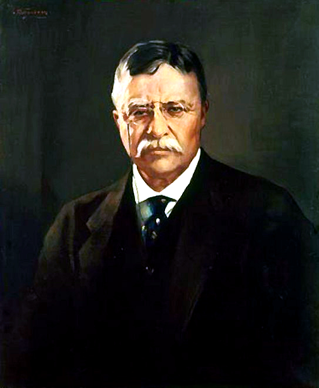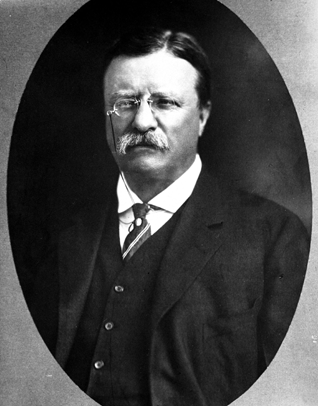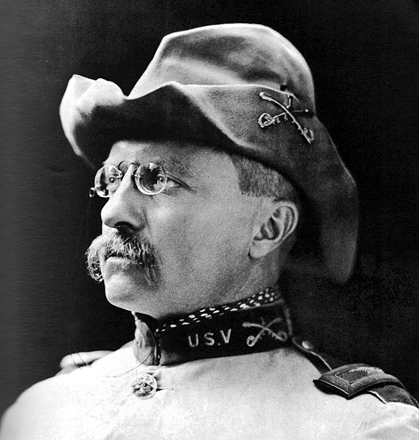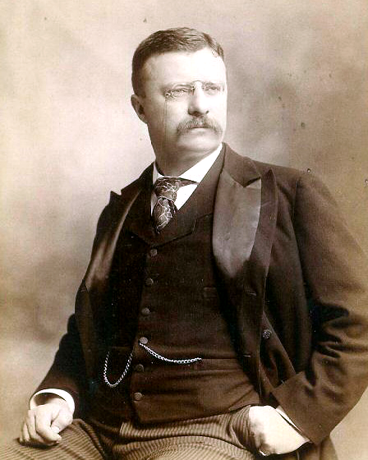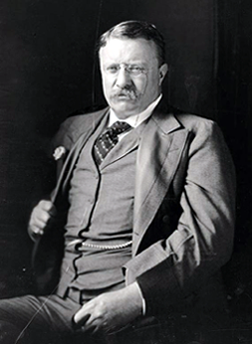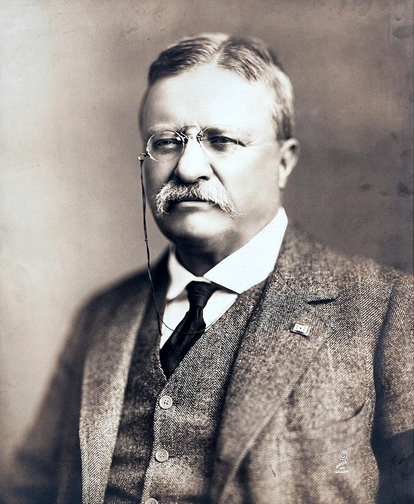|
THEODORE ROOSEVELT |
|
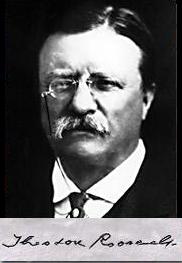
THE 26TH PRESIDENT OF
THE UNITED STATES OF AMERICA
(1901-1909)
ROOSEVELT, Theodore "T.R." "Teddy"
(1858–1919), 26th president of the U.S. (1901–9). The first president to exploit the public dimensions of his office in an age of mass communications, he was a reform leader at home and a skilled diplomat abroad. In his lifetime Roosevelt became a personal model, particularly for the country’s youth, in a way that no public figure has matched. He was one of the most popular presidents in American history.The son of a wealthy, socially prominent merchant, Roosevelt was born in New York City on Oct. 27, 1858. He was educated by private tutors and studied at Harvard University, graduating in 1880 as a member of Phi Beta Kappa and the most prestigious social clubs. Ill health marred his boyhood, and he suffered poor eyesight, attacks of asthma, and nervous digestion, before teenage body-building efforts transformed him into a strong, vigorous young man. After his father’s sudden death in 1878, Roosevelt forsook scientific ambitions, developed political interests, and became engaged to Alice Lee (1861–84) of Boston, whom he married in 1880. Alice Roosevelt died in 1884, just after the birth of their only child. Their daughter, also named Alice, as Alice Roosevelt Longworth (1884–1980) became a well-known Washington personality in later years. In 1886 Roosevelt married Edith Carow (1861–1948) of New York, who became his most valued adviser. They had a daughter and four sons, the oldest of whom, Theodore Roosevelt, Jr. (1887–1944), was a decorated hero in the two world wars.
Early Political Career.
After graduation from college, Roosevelt entered politics and abandoned the study of law when, as a Republican, he was elected to the New York State Assembly in 1881. He attracted immediate attention in the press with his upper-class background, colorful personality, and bold independence. In 1884, after serving three years in the Assembly, he left politics briefly, both from grief at the death of his wife and because he had alienated the reform wing of his party that year by supporting James G. Blaine for the presidency. Roosevelt spent the next two years ranching and hunting in the Dakota Territory, which began his identification with the Wild West. He continued to write histories, biographies, and magazine articles, producing more than a dozen books between 1880 and 1900. Back in politics in 1886, he ran unsuccessfully for mayor of New York City, campaigned for the national Republican ticket in 1888, and served as Civil Service commissioner in Washington, D.C., from 1889 to 1895. From 1895 to 1897, Roosevelt renewed political ties and enhanced his fame with his energetic, reform-minded service as New York City’s police commissioner. After campaigning for his party’s national ticket again in 1896, he became assistant secretary of the navy and worked to expand and modernize the navy and get the U.S. into war with Spain over Cuba.
War Hero and Vice-President.
The Spanish-American War made Roosevelt a nationally known figure. His volunteer cavalry regiment, which included both cowboys and aristocrats like himself, was dubbed the Rough Riders and received extensive press coverage. Their charge at the Battle of San Juan Hill in Cuba (July 1898) was the most celebrated exploit of the war. Roosevelt became a popular hero overnight, and his favorite nickname for the rest of his life was the Colonel. He reaped a swift political reward when his party’s New York boss, Senator Thomas C. Platt (1833–1910), chose him to run for governor in the face of scandals that threatened a Republican defeat. Enormous crowds greeted the candidate wherever he appeared in the 1898 campaign, and he carried his ticket to a narrow victory. Those crowds and similar outpourings when Roosevelt traveled west to a Rough Riders’ reunion in 1899 propelled him toward the Republican vice-presidential nomination as William McKinley’s running mate in 1900. Also favoring his nomination was Senator Platt’s desire to get him out of New York. Roosevelt was an activist, independent governor, who did not submit to the Republican organization; he responded to popular disquiet over big business and showed his own concern over conservation of natural resources. Gracefully although unwillingly submitting to the vice-presidential draft, Roosevelt demonstrated his energy and popularity again in the 1900 campaign, as he made whirlwind tours appealing to patriotic memories of the war. He had little to do as vice-president, but his inactivity ended with McKinley’s assassination in September 1901, when Roosevelt became the youngest president in U.S. history.
Domestic Policy.
Roosevelt’s entry into the White House changed politics more in mood than in substance. With his vivid personality, ceaseless activity, young family, and social glamour, he became a popular idol, a position he cultivated by careful attention to the press and a flair for the dramatic. On domestic issues he moved cautiously, probably going little further in his first term than McKinley would have done. Well-publicized prosecutions of big businesses earned him acclaim as a trustbuster, and his public mediation of the anthracite coal strike in 1902 showed sympathies for labor and consumers. One issue on which he did move boldly was conservation, both by publicizing it long before any other leader and by using his presidential powers, often high-handedly, to set aside 125 million acres (about 51 million ha) of western land as national forests.
Roosevelt went further after his triumphant election in 1904. Having consolidated his position among Republicans, he won the nomination without any opposition and ran on his record, which he called the Square Deal, to win an enormous victory over his colorless Democratic opponent, Alton B. Parker (1852–1926). Roosevelt’s second term brought two legislative milestones—passage of the Hepburn Act of 1906, which strengthened the powers of the Interstate Commerce Commission, and the Pure Food and Drug Act of 1906, which established the Food and Drug Administration. He later advocated further measures to deal with big business and social problems, but conservative opponents in his own party blocked those proposals. Roosevelt wielded his political power at home for the last time in 1908 by picking his friend, Secretary of War William Howard Taft, as his successor, engineering Taft’s nomination and aiding his election to the presidency.
Foreign Policy.
Roosevelt pursued an activist foreign policy from the beginning of his presidency, in keeping with his longtime motto "Speak softly and carry a big stick." Sometimes he moved quietly and delicately behind the scenes, as when he fended off possible German intervention in Venezuela in 1902 and when he worked to preserve the European balance of power in a series of crises between 1904 and 1906. At other times he acted loudly and bluntly, as when he abetted the 1903 revolution in Panama that led to U.S. acquisition of territory for the Panama Canal, and when he proclaimed that the U.S. had "police power" over Latin America in the Roosevelt Corollary to the Monroe Doctrine (1904). He used both public and private channels in his mediation of the Russo-Japanese War in 1905—which won him the Nobel Peace Prize, the first to go to an American—and when he sent a delegation to the Algeciras Conference of 1906 to help settle a conflict between Germany and France over the control of Morocco.
Throughout his presidency Roosevelt labored to strengthen and modernize the armed forces. His secretaries of war, Elihu Root and Taft, introduced the general staff system to the army and streamlined reserve methods. The navy remained a special concern with Roosevelt, and he harried Congress, with partial success, to build more battleships and cruisers. In 1907 he sent America’s battle fleet on a voyage around the world, both to impress Japan during a controversy over exclusion of Oriental immigrants and to display the nation’s new naval prowess. At the same time, he dispatched Taft to negotiate agreements that appeased Japanese interests in Manchuria and helped defuse the dispute over immigration. Roosevelt left a record of strong diplomacy usually tempered by sensitivity and restraint, and he made his last public appearance as president in February 1909, when he reviewed the fleet returning from its world cruise.
Third Party Leader.
Stepping down from office at the age of 50, younger than most other presidents have been when first elected, Roosevelt went abroad for more than a year, first on a hunting and nature-study safari to Africa and then on a spectacular tour of the European capitals. On his return home in the summer of 1910 he quickly became embroiled in factional fights among Republicans and slowly but steadily became estranged from his successor. Roosevelt finally broke with Taft both because he could not abide the new president’s inept handling of the split between progressive and conservative Republicans and because he resented his own loss of power. Assuming command of the progressives and advocating farther-reaching economic and social reforms, Roosevelt contested the 1912 Republican presidential nomination, winning most of the primaries but losing at the convention to the same presidential party control he had earlier used to nominate Taft. Charging that he had been cheated of the nomination, Roosevelt bolted to run as the candidate of the hastily formed Progressive party.
Assassination attempt.
Three and a half years after he left office, Roosevelt was running for President as a member of the Progressive Party. Before a campaign speech, while Roosevelt was campaigning in Milwaukee, Wisconsin, on October 14, 1912, a saloonkeeper named John Flammang Schrank from New York who had been stalking him for weeks, shot Roosevelt once in the chest with a .38 caliber revolver, but the bullet lodged in his chest only after penetrating, the 50-page text of his campaign speech folded over twice in Roosevelt's breast pocket and a metal glasses case slowed the bullet, saving his life. Schrank was immediately disarmed, captured and may have been lynched had Roosevelt not shouted for Schrank to remain unharmed.
Roosevelt, as an experienced hunter and anatomist, correctly concluded that since he was not coughing blood, the bullet had not completely penetrated the chest wall to his lung, and that he was not mortally wounded, he declined suggestions he go to the hospital immediately. Instead, he delivered his scheduled speech with blood seeping into his shirt. He spoke for 90 minutes. His opening comments to the gathered crowd were, "Ladies and gentlemen, I don't know whether you fully understand that I have just been shot; but it takes more than that to kill a Bull Moose." Thereafter, the Progressives were nicknamed the Bull Moose party. Afterwards, probes and x-rays showed that the bullet had traversed three inches (76 mm) of tissue and lodged in Roosevelt's chest muscle but did not penetrate the pleura, and it would be more dangerous to attempt to remove the bullet than to leave it in place. Roosevelt carried it with him for the rest of his life.
Because of the bullet wound, Roosevelt was taken off the campaign trail in the final weeks of the race (which ended election day, November 5). Though the other two campaigners stopped their own campaigns in the week Roosevelt was in the hospital, they resumed it once he was released. The bullet lodged in his chest caused his rheumatoid arthritis—which he had suffered from for years—to get worse and it soon prevented him from doing his daily stint of exercises; Roosevelt would soon become obese as well. Roosevelt, for many reasons, failed to move enough Republicans in his direction. Roosevelt outpolled Taft—a tribute to his abiding popularity—but his hopes of winning and establishing a new major party were thwarted. He did win 4.1 million votes (27%), compared to Taft's 3.5 million (23%). However, The Democratic nominee, who also appealed to progressives, Woodrow Wilson's 6.3 million votes (42%) were enough to garner 435 electoral votes. Roosevelt had 88 electoral votes to Taft's 8 electoral votes. This meant that Taft became the only incumbent president to place third in a re-election bid. But Pennsylvania was Roosevelt's only eastern state; in the Midwest, he carried Michigan, Minnesota and South Dakota; in the West, California and Washington; he did not win any southern states.
At Schrank's trial, the would-be assassin claimed that William McKinley had visited him in a dream and told him to avenge his assassination by killing Roosevelt. He was found legally insane and was institutionalized until his death in 1943.
World War I.
After his 1912 defeat, Roosevelt spent the last six years of his life in mounting frustration, first over Wilson’s enactment of much of his reform program, then over American neutrality after the outbreak of World War I in 1914, and finally over his own failure to be allowed to raise a division to fight in France after the U.S. entered the war in 1917. Although he continued to advocate domestic reforms, he increasingly devoted himself to calling for a strong pro-Allied foreign policy and greater military preparedness. Roosevelt was gradually reconciled with his former party opponents, including Taft. He disbanded the Progressives in 1916 to back the Republican nominee against Wilson, and it seemed certain that he would be the party’s candidate in 1920. His four sons all fought in World War I, and the death of the youngest, Quentin (b. 1897), in combat as an aviator in August 1918, was a heavy blow. Roosevelt’s health deteriorated during the final years of his life, partly as a result of tropical fevers contracted on an expedition to the Amazon region of Brazil in 1914.
Death.
Despite his rapidly declining health, Roosevelt remained active to the end of his life. He was an enthusiastic proponent of the Scouting movement. The Boy Scouts of America gave him the title of Chief Scout Citizen, the only person to hold such title. One early Scout leader said, "The two things that gave Scouting great impetus and made it very popular were the uniform and Teddy Roosevelt's jingoism."
On January 6, 1919, Roosevelt died in his sleep at Oyster Bay, N.Y., of a coronary thrombosis (heart attack), preceded by a 2½-month illness described as inflammatory rheumatism, and was buried in nearby Youngs Memorial Cemetery. Upon receiving word of his death, his son Archie telegraphed his siblings simply, "The old lion is dead." The U.S. vice president, Thomas R. Marshall, said that "Death had to take Roosevelt sleeping, for if he had been awake, there would have been a fight." In addition to wife Edith, Theodore was survived by five children and eight grandchildren at the time of his death.
Memorials.
Roosevelt was included with George Washington, Thomas Jefferson, and Abraham Lincoln at the Mount Rushmore Memorial, designed in 1927 with the approval of Republican President Calvin Coolidge.
For his gallantry at San Juan Hill, Roosevelt's commanders recommended him for the Medal of Honor. In the late 1990s, Roosevelt's supporters again took up the flag for him. On January 16, 2001, President Bill Clinton awarded Theodore Roosevelt the Medal of Honor posthumously for his charge up San Juan Hill, Cuba, during the Spanish–American War. His eldest son Ted received the Medal of Honor for heroism at the Battle of Normandy in 1944. The Roosevelt’s thus became one of only two father-son pairs to receive this honor (the other pair being Arthur MacArthur, Jr. and Douglas MacArthur).
Roosevelt's legacy includes several other important commemorations. The United States Navy named two ships for Roosevelt: the USS Theodore Roosevelt (SSBN-600), a submarine that was in commission from 1961 to 1982; and the USS Theodore Roosevelt (CVN-71), an aircraft carrier that has been on active duty in the Atlantic Fleet since 1986.
On November 18, 1956, the United States Postal Service released a 6¢ Liberty Issue postage stamp honoring Roosevelt. A second stamp of face value 32¢ was issued on 3 February 1998 as part of the Celebrate the Century stamp sheet series.
The Roosevelt Memorial Association (now the Theodore Roosevelt Association) or "TRA", was founded in 1920 to preserve Roosevelt's legacy. The Association preserved Roosevelt's birthplace, "Sagamore Hill" home, papers, and video film. In 1941, it published the Theodore Roosevelt Cyclopedia, a compendium of Roosevelt's key writings, sayings and conversations, which is available online.
In 2008 Columbia Law School awarded a law degree to Roosevelt, posthumously making him a member of the class of 1882. Among the hundreds of schools and streets named in Roosevelt's honor are Roosevelt High School in Seattle, Washington, the surrounding Roosevelt neighborhood, the district's main arterial, Roosevelt Way N.E., and Roosevelt Middle School in Eugene, Oregon.
The Hollywood Roosevelt Hotel in Los Angeles is named after him, as is the Roosevelt Hotel in New York City.
In Chicago, the city renamed 12th Street to Roosevelt Road four months after Roosevelt's death. In Philadelphia, Roosevelt Boulevard, also known as U.S. 1, was named in his honor in 1918.
